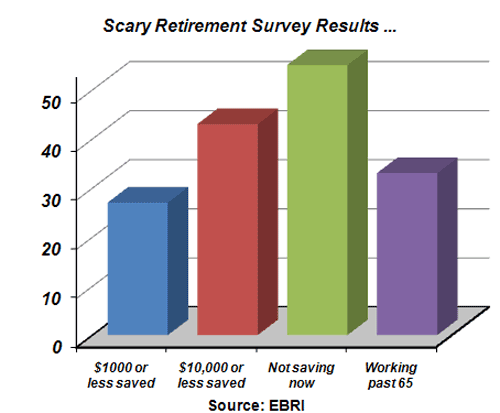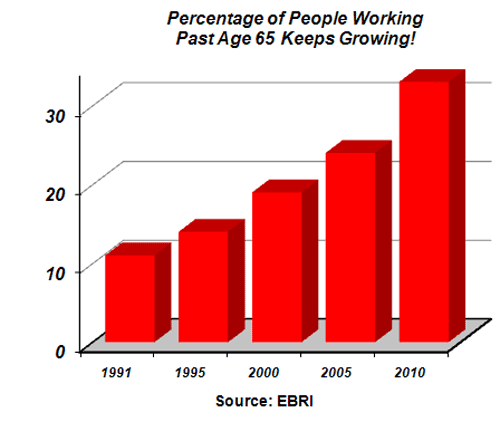More Pensions and Retirement Disasters
Personal_Finance / Pensions & Retirement Mar 16, 2010 - 09:42 AM GMTBy: Nilus_Mattive
 I can’t believe the number of frightening retirement stories I’ve seen in just the last week. They suggest that the vast majority of our country’s citizens are completely unprepared for life after work. They point to a governmental backup system that is getting ever more desperate. And they suggest that other traditional sources of retirement income — such as corporate pensions — are in grave danger of imploding.
I can’t believe the number of frightening retirement stories I’ve seen in just the last week. They suggest that the vast majority of our country’s citizens are completely unprepared for life after work. They point to a governmental backup system that is getting ever more desperate. And they suggest that other traditional sources of retirement income — such as corporate pensions — are in grave danger of imploding.
Let’s start with a truly mind-blowing fact …
43 percent of American Workers Have Less Than $10,000 in their Retirement Accounts!
Yes, you read that right. According to the Employee Benefit Research Institute’s 2010 Retirement Confidence Survey, a whopping 43 percent of American workers said they have less than $10,000 in retirement savings.
That number excludes pensions and housing wealth. But even if those areas weren’t as shaky as they are, does anyone actually think that $10,000 will even last the average American half a year in retirement?
Oh, and it gets worse — 27 percent of the workers surveyed had less than $1,000 in their accounts! Think about it — a full quarter of Americans barely have enough saved for a few utility bills.
No wonder only 16 percent of the survey respondents said they were “very confident” in their ability to save enough for a comfortable retirement, while 24 percent said they were going to have to work longer.

Now, we could blame the market meltdown and the recession for some of this, especially since all of these numbers have been getting worse over the last few years. But I think a lack of planning and personal responsibility play an even larger role here. Why?
Because an astounding 54 percent of the survey participants said neither they nor their spouses had even tried to figure out much money they’ll need in order to live comfortably in retirement!

Look, if you don’t know how much you’ll need … you aren’t putting a plan in place … and you aren’t saving vigorously (60 percent said they weren’t saving at all!) … then you’re absolutely doomed to fail.
What’s more, as I’ve said time and again here in Money and Markets, these people shouldn’t expect the traditional governmental backup to save them. For more proof, just consider another piece of news that came out last week …
Uncle Sam Might Want Your Social Security Checks!
As reported in a recent Wall Street Journal, a small part of the 2008 Farm Bill will now allow Uncle Sam to withhold Social Security funds from anyone with outstanding debts, even if those debts are ten years or older.
This new legislation applies to a broad category of outstanding debts, including farm and small business loans, and a similar statute of limitations was lifted on student loans in 1997. In other words, only income taxes continue to remain covered by a decade-long limitation.
Now, don’t get me wrong. If you borrowed money from the government, I think you should be held accountable until it’s repaid. Otherwise, the rest of us are simply footing the bill for your irresponsibility.
And I absolutely don’t think you should receive another dime out of any program until those debts are repaid! If anything, the fact that Treasury can only withhold 15 percent of benefits (down to a minimum monthly payment of $750 in all instances except owed income taxes) makes little sense.
But there are three important things I’d like to note about this new legislative twist …
First, the fact that Washington is coming after this source of revenue so aggressively demonstrates just how desperate they are to get more money into Social Security’s coffers.
Second, regardless of morality, it’s going to mean more retirement pain for many Americans.
Third, this is the government we’re talking about, which means there’s big potential for abuse and mistakes surrounding the new legislation.
In fact, the Wall Street Journal article goes on to talk about a couple examples of the “sometimes-Kafkaesque process debtors can face when challenging the validity of a claim.” It’s truly scary stuff!
And last but not least, let’s talk about one more frightening retirement story. Namely, the fact that …
“Public Pension Plans Are Adding Risk to Raise Returns”
So says a New York Times article dated March 9. The piece goes on to explain that some of the nation’s public retirement plans are turning to riskier investments to try and regain money lost during the market downturn:
“Though they generally say that their strategies are aimed at diversification and are not riskier, public pension funds are trying a wide range of investments: commodity futures, junk bonds, foreign stocks, deeply discounted mortgage-backed securities and margin investing. And some states that previously shunned hedge funds are trying them now.”
That’s disconcerting news. After all, what happens if markets suddenly turn against riskier investments again? Then public pension funds will suffer additional losses rather than making up for past ones. And if you’re a taxpayer in that state — you’ll end up footing the bill in the end!
Meanwhile, the article also notes that corporate pension plans are becoming more conservative, and abandoning stocks for bonds, saying …
“Pension funds rarely trumpet their intentions, partly to keep other big investors from trading against them. But some big corporations are unloading the stocks that have dominated pension portfolios for decades. General Motors, Hewlett-Packard (HPQ), J. C. Penney (JCP), Boeing (BA), Federal Express and Ashland are among those that have been shifting significant amounts of pension money out of stocks.
“Other companies say they plan to follow suit, though more slowly. A poll of pension funds conducted by Pyramis Global Advisors last November found that more than half of corporate funds were reducing the portion they invested in United States equities.”
Again, it’s interesting to note that these firms are mainly switching into longer-dated government bonds — precisely the investments that many of us at Weiss have been warning about lately.
The plans say they aren’t concerned about a collapse in long-term Treasury prices because they’ll hold their bonds to maturity. But even then, I can’t figure out why they think now is the time to lock-in pitifully low interest rates.
If anything, it seems to me that both the public and private pension funds are making bad long-term moves on opposite ends of the spectrum, which only furthers my main point …
If You Want to Succeed and Enjoy Retirement, You Need a Realistic Plan and You Absolutely Must Stick With It!
Put all these little tidbits together, add in all the big-picture trends that I’ve covered many times before, and you begin to realize just how dire the overall state of retirement is in the United States today.
Quite frankly, it sounds like the vast majority are either going to work until they die or live their golden years pinching every penny.
However, that doesn’t mean that you and I have to be among them. The key is planning and preparing. There are lifestyle and work adjustments that can be made. Investments that can help build up nest eggs and kick off income, conservatively. Strategies that can maximize Social Security benefits, lessen tax bites, and more.
So ultimately, it boils down to getting the facts and then having the discipline to put your knowledge to work. I’ll do my part to continue covering this important area of investing. And I trust that you’ll continue acting on the information that suits your needs the best.
Best wishes,
Nilus
P.S. For more information on some of my favorite retirement strategies right now, check out my new online education course, The Ultimate Retirement Survival Guide.
This investment news is brought to you by Money and Markets. Money and Markets is a free daily investment newsletter from Martin D. Weiss and Weiss Research analysts offering the latest investing news and financial insights for the stock market, including tips and advice on investing in gold, energy and oil. Dr. Weiss is a leader in the fields of investing, interest rates, financial safety and economic forecasting. To view archives or subscribe, visit http://www.moneyandmarkets.com.
© 2005-2022 http://www.MarketOracle.co.uk - The Market Oracle is a FREE Daily Financial Markets Analysis & Forecasting online publication.



